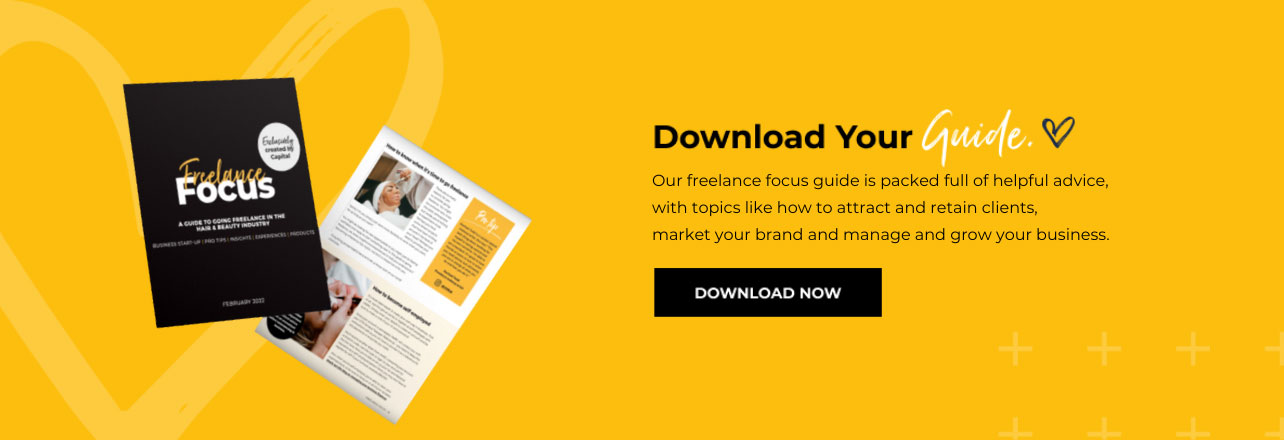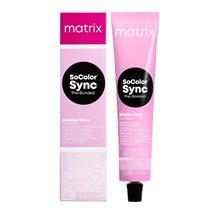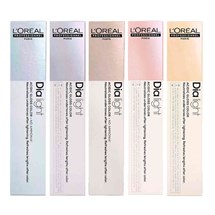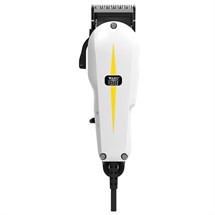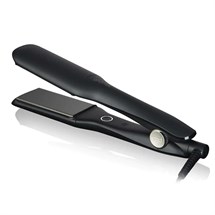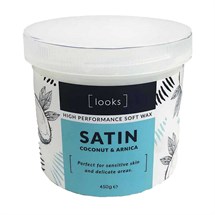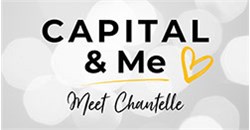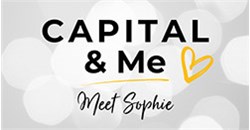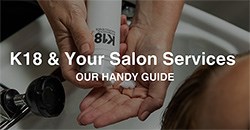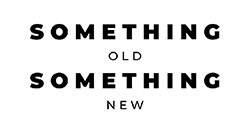Menu

Setting up your business: A guide for Freelancers
So, you've decided to embark on the journey of freelancing in the vibrant world of hair and beauty. Congratulations! Here, we'll provide you with the latest insights and essential steps to set up your business as of 2023.
Getting Started
First and foremost, to legally operate as a freelancer, you must register as self-employed. You should complete this step within three months of working for yourself and receiving your initial payment. Head over to the gov.uk portal to register as self-employed with HMRC. Create your account by entering your details and make sure to keep a record of your ID and password.
After your account is processed, HMRC will provide you with your UTR (Unique Taxpayer Reference). Safeguard this reference because you'll need it frequently for transactions and inquiries. Additionally, you'll receive another letter containing your account activation code. This code allows you to access your account and set up your tax and National Insurance contributions as a self-employed professional.
Remember, you may also need to register for VAT if your annual turnover exceeds £85,000. Turnover refers to your total earnings from serving clients during the accounting year before expenses. Plan accordingly to accommodate the additional costs associated with VAT if you anticipate reaching this threshold.
Top Financial Tip
Open a separate savings account as part of your business account and allocate any VAT earned from your services to this account. This practice ensures you don't accidentally spend this money and provides a reserve for your quarterly VAT returns.
Key Dates for the Tax Year 2023
Stay organised by marking these key financial dates for the tax year:
- 6 April 2023 – Commencement of the new 2023/2024 financial year
- 31 July 2023 - Deadline for payments on account for Income Tax
- 31 October 2023 - Deadline for postal submission of Self-Assessment tax returns for the tax year ending 5 April 2022
- 31 January 2024 - Deadline for filing Self-Assessment Tax Returns for the tax year ending 5 April 2023
- 5 April 2024 - Conclusion of the 2023/2024 financial year
Setting Up a Business Bank Account
While it may seem convenient to manage personal and business finances from the same account initially, it can lead to complications in the long run, particularly in terms of business accounting. Therefore, we recommend establishing a dedicated business bank account. This makes it easier to track all your income and expenses, as well as manage your salary.
For self-employed hairdressers and beauty therapists, it's crucial to set money aside as you earn to cover tax, National Insurance, and, if registered, VAT. This avoids the stress of facing a large tax bill at the end of the year. We suggest opening a savings account alongside your business account to prevent spending these funds throughout the year. Setting aside around 25-30% of your income should typically cover tax and NI payments.
Keep in mind that the current personal allowance before you pay income tax is £12,500, allowing you to pay yourself up to £1,000 per month tax-free.
Additionally, remember that as a self-employed professional, you can claim expenses. Keep all your receipts for your accountant or to digitize using your chosen accounting app. Eligible expenses include hair and beauty products, uniforms, travel, training, marketing, insurance, phone expenses, fuel, accountant fees, and office equipment. If you're VAT-registered, you can also claim back VAT on business-related purchases. Consult your accountant for specific details on what items qualify.
Additional Considerations
These are the fundamentals for setting up your freelance business. However, you'll need to consider other aspects like whether you'll be a mobile freelancer, renting salon space, setting up a home salon, pricing your services, mastering social media marketing, and your training and upskilling plans.
Before commencing your freelance journey, it's highly recommended to seek professional advice from an accountant or tax consultant to ensure you're on the right financial path. We're here to support you in every step of your freelance adventure.
Freelance Focus
Freelance Focus, is a one stop resource for anyone working as a freelancer or thinking of going freelance in the hair & beauty industry, which includes a FREE downloadable guide filled with advice, useful insights, experiences and tips (from experienced freelancers) to help you understand the steps needed to make the right choices for you.
Top trending
OFFER
VEGAN
Delivery
Collection
Please login to your account to check stock in your local store.
4 FOR THE PRICE OF 3
Delivery
Collection
Please login to your account to check stock in your local store.
VEGAN
Delivery
Collection
Please login to your account to check stock in your local store.
Delivery
Collection
Please login to your account to check stock in your local store.
OFFER
Delivery
Collection
Please login to your account to check stock in your local store.
SAVE 25%
Delivery
Collection
Please login to your account to check stock in your local store.
Delivery
Collection
Please login to your account to check stock in your local store.
OFFER
VEGAN
Delivery
Collection
Please login to your account to check stock in your local store.
BUY 3 FOR THE PRICE OF 2
Back to Posts
Tags
- acne
- advice
- allergy
- apps
- autumn
- awards
- balayage
- barbering
- beauty industry
- blonde
- braids
- bridal
- brows
- business
- capital & i
- career
- christmas
- client loyalty
- color wow
- covid-19
- curls
- eyelash
- facial
- fanola
- festive
- finance
- freelance
- gellux
- hair
- hair care
- hair colour
- hair salon
- hair styles
- hair styling
- hair trends
- hairdressing
- hairstyle
- hairstyles
- halloween
- healthy
- how to
- hygiene
- ideas
- indola
- industry
- inspiration
- interview
- k18
- lashes
- lockdown
- loreal
- macadamia
- make up
- makeup
- manicure
- marketing
- mens
- mental health
- microblading
- nail art
- nail industry
- nail inspiration
- nail technician
- nail trends
- nails
- new years
- nioxin
- nxt
- olaplex
- opi
- party
- pedicure
- ponytail
- products
- professional
- professionals
- pulp riot
- redken
- reopening
- retail
- reviews
- revlon
- salon
- salon finance
- salon furniture
- salon management
- salon owner
- salon refit
- salon services
- salon system
- salons
- schwarzkopf
- self care
- self-care
- self-employed
- skills
- skincare
- skincare regime
- skincare steps
- social
- social media
- spa
- spring
- step by step
- style
- styling
- stylist
- summer
- sun damage
- suncream
- sustainable
- tanning
- technique
- the manicure company
- tigi
- tiktok
- time to improve
- tips
- toner
- toning
- top knot
- training
- treatment
- trending products
- trends
- tutorial
- updo
- upskills
- valentines
- vegan
- vegan beauty
- veganuary
- wahl
- waxing
- wedding
- wella
- wellbeing
- wellness
- winter
- winter nails
Latest Posts
- Chantelle: Capital & Me, my self-employed journey & the importance of networking
- Meet Sophie, owner of ‘Sophie’s Lashes & Beauty’ which she has been running now for over 7 years!
- K18 Biomimetic Hair Science vs. Bond Builders
- K18 & Your Salon Services - How to incorporate K18 Services for Ultimate Hair Restoration
- What is K18 and how does it work?
- From Money Worries to Family Drama: What's Stressing Your Skin & Hair the Most?
- Something Old - Something New
- Skin Cycling 101
- Vegan and Cruelty-Free Hair and Beauty: Simple Swaps and Recommendations for Veganuary
- The Greatest Night in British Hairdressing!
Related Posts
Chantelle: Capital & Me, my self-employed journey & the importance of networking
Introducing Chantelle, a talented beautician, hair extension specialist and proud owner of ‘Chantelle’s Beautique’. We sit down with Chantelle as she tells us how she started out in the industry, her top tips for becoming self-employed, struggles she faced and overcame along the way and her favourite products that she can’t live without!
My treatment room is based in my garden at home and I offer a full range of Hair and Beauty treatments specialising in skin care, brows & hair extensions. My clients love my set up and really appreciate the little touches like being able to park with ease and having more of a cosy experience away from the hustle and bustle of a busy salon. As well as running my own business at home, I also enjoy teaching others on their journey starting out in the trade with my own accredited courses at home as another branch of my business called ‘The Hair and Beauty Training Beautique’. You may also see me in your local Capital Hair & Beauty as I also tutor for one of their training providers ‘Face Forward’ offering brow lamination and lash lift and tint courses.
Meet Sophie, owner of ‘Sophie’s Lashes & Beauty’ which she has been running now for over 7 years!
Sophie gained a wealth of experience working in the industry from her background working in prestigious 5 hotel & spa and salon settings which lead her up to starting a business of her own. We talk about all things beauty and the curved tweezers that she can’t live without!
Hi Sophie, tell us a little bit about your journey and how you go into the industry and what lead up to starting out on your own?
I gained a lot of knowledge from working in different settings from working with a big teams in a 5 star hotels and spas to smaller beauty salon environments. I gained so much knowledge from working in both settings and although it was hard work and long hours.
I started out by working in a few different 5 star hotels with spas and a salons where I gained all my knowledges and experiences from each one to put together for my own business! It was hard work and long hours all the practice paid off. It was actually one of my clients I saw regularly in the salon I worked at that said I should set up on my own and gave me the confidence to go self-employed and I’ve not looked back since!
K18 Biomimetic Hair Science vs. Bond Builders
As professionals in the hairdressing industry, we're well aware of the constant innovation occurring in our field. Our clients love to dramatically alter their look with the ever-changing trends and we do everything we can to prioritise the health of their hair. Bond-building treatments have long been a staple in salons to address this need. However, allow us to present the latest advancement: biomimetic hair science and K18!
Understanding the Future of Haircare: From Bond Builders to Biomimetic Hair Science
For centuries, the haircare industry relied on cosmetic chemistry to conceal damage. Historical solutions like oils and conditioners were designed to sit on the surface of the hair, providing a temporary fix by improving its appearance and manageability. However, these solutions fell short of addressing hair's health at its core.
K18 & Your Salon Services - How to incorporate K18 Services for Ultimate Hair Restoration
Learn how to leverage K18 products in your salon services to reverse damage, fortify hair and enhance salon results all whilst boosting your salon profits. Discover our step-by-step instructions for every treatment, from lightening to styling in our handy salon go-to guide!
What is K18 and how does it work?
Following the natural structure of hair, the biologically active peptide is considered natural. Unlike traditional bonding agents, it is not rinsed away by water or shampoo, making K18 a genuine and enduring remedy for damaged hair. Healthy hair originates in the salon, and K18 believes its influence starts at the salon chair and radiates outward. While K18 is suitable for all hair types and services, the most significant improvements are seen in damaged hair.
From Money Worries to Family Drama: What's Stressing Your Skin & Hair the Most?
Have you ever noticed how closely linked your mind and body are? It's like they're always communicating, even when we're not tuned in.
And when stress creeps in, it's not just your mind that feels the burden – your skin and hair can take a hit too. Stress, whether it's a short-term or a long-term problem, can be detrimental to your body's health.
In fact, a recent survey by the UK’s largest independent supplier to hair and beauty professionals, Capital Hair and Beauty, revealed nearly half (42%) of the nation believe that stress has had a negative impact on their skin and hair health!
Last year, Brits faced their fair share of hair and skin woes.Topping the list was the recurring issue of dry skin, affecting a significant 29% of the population. Not too far behind was hair thinning/loss, troubling over a fifth (22%) of us, while acne and breakouts are also a cause for concern, affecting 19% of survey respondents. And let's not forget about skin inflammation (12%) and eczema (11%).
Something Old - Something New
Does the bob ever go out of style? Short answer: No. The reason for the evergreen appeal of the bob is because, depending on the length, it’s a look that can suit any face shape or hair texture. Right now, it can be anything from a short and swingy French girl bob, a luxurious long bob, or a razor-cut curly bob. For Tori Kiff, it’s about keeping things fresh with the addition of a fringe.
“I love updating a classic curly bob with a fringe, especially as so many of my curly clients seem to think it’s a style they shouldn’t have. I’ve managed to show so many clients that it’s all down to fear and that actually, a curly bob is so flattering and easy to style; I advise them to use their fingers to curl their fringes or to use a brush when styling,” shares Tori.
Of course, the most modern way to wear a bob is the Bixie, a hybrid of the bob and pixie; think classic bob updated with a fringe or micro bangs, or you could play with the Butterfly Bob. RUSH Creative Director Andy Heasman’s a fan.
Skin Cycling 101
If you ever spend time on social media, then you'll definitely have heard about skin cycling, or skin fasting. During the pandemic, this three-step regime rose to popularity as many of us had more time to spend on pursuing our 'perfect' skin. Read on to find out the what and why of skin cycling and how you can build it into your beauty therapy menu.
